#dont let anyone become the gatekeeper of your experience
Explore tagged Tumblr posts
Text
Look, if someone who isn't a psychologist tries to position themselves as an authority on your trauma & then backpedals when you stand in your truth on the innocent premise that they're "just trying to learn"...
They are not trying to just learn. Otherwise, they wouldn't have come at you like they're someone with a PHD and more experience than you are with your trauma. They aren't trying to learn, they're trying to manipulate you. End of story.
Own your own reality. Let them be curious somewhere else. You don't owe anyone an explanation.
#spilled thoughts#spilled words#manipulation#trauma#manipulative positioning#i hate people like this#advice#stand in your own experience#own your power#dont let anyone become the gatekeeper of your experience
8 notes
·
View notes
Note
Please overanalyze the shadows in his palace I am begging you.
@appleyjuiceboy / jester owns my braincells of course i would do this for u
Okay so i think its best if i go about the order of shadows we meet in the game so. I’m not going to go into the persona/shadows in maruki’s palace. I’ll leave that for some other day. Now! Lets hope i can remain fully coherent.
1) The fluffy haired noodle shadow we meet for (ka)sumi’s awakening

First off, look at the design of this shadow--it has the fluffy hair parted to the right like maruki, its androgynous figure, and that swirly face mask as well! The mask has two eyes, and it even looks like theres a smile there, lopsided.
We have never seen any other palace shadow taking a similar shape as the palace ruler (except maybe the yaldaboath palace). Shadows are meant to emulate what the ruler thinks of as protectors of their heart. Maruki doesn’t trust anyone other than himself with this secret. And particularly at this phase of his distortion -- there are no scientists, to attendants, no patients. Just an empty, beautiful palace -- with possibly only one type of shadow and protector. The type that represents himself.
(Also androgynous/nb maruki confirmed ?? yes)
Okay then lets look at what this shadow says to Kasumi.
Shadow: ... Heresy. You dare to spurn our lord’s mercy. Accept yourself... Our lord laments the foolishness birthed from your pain.
Having the context that Kasumi is Sumire here ... Because this scene comes about because Kasumi sees a cognitive version of herself (Sumire) blaming herself -- and so, a part of her is probably trying to remember that she is Sumire. Thus ‘spurn(ing) our lord’s mercy’. And yeah accepting herself as Kasumi instead of trying to remember that she is Sumire.
But most important is the fact that Maruki’s palace shadows refer to him as a religious or god-like being (’our lord’s mercy’ calling back christian themes). Someone who is merciful and, most of all, does feel grief over one’s pain. Painting an ideal picture of a loving and caring god, ala abrahamic religions. This is a running theme with all the shadow’s dialogs. Let’s put a pin in this for now.
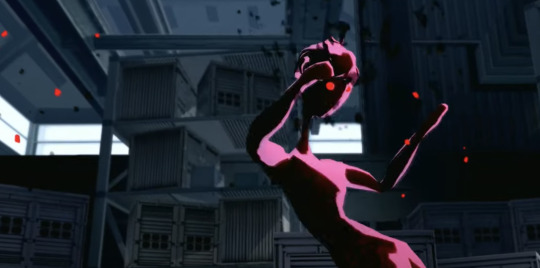
These design shadows are seen again later in the container room of the palace. They’re slightly faster. The container room is a strange one -- because it doesn’t quite fit in with the rest of the laboratory/hospital/garden of eden thing going on. While yes labs and hospitals do have storage areas, i cant imagine them being a container warehouse like this. I do headcanon that this is a storage area for the pain and suffering that Maruki has taken on from other people in order to heal them, due to his hyper empathy -- but i’ll analyse the room some other time. For now it’s interesting that the Maruki-like shadows are now relegated to this specific and really dark section of the palace.
Like the throne room/centre of eden that the Maruki boss fight takes place in -- He resigns himself to the darker gloomier parts of his palace. And the same goes for these shadows. This is where he belongs.
Also abso-fucking-lutely we’re going to talk about how this shadow transforms when it ambushes you:
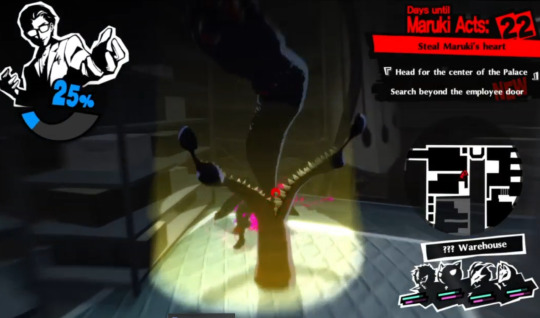
Skin suit opening up to reveal fangs and rows of teeth, and a formless monster inside. Maruki ... dude ... are you okay? If these shadows are meant to emulate him -- is this how he sees himself sometimes? HHh boy...
2) First lab coat wearing shadow at the start of his palace investigation

Prior to this, while we understood that Maruki was a researcher, it was never a defining feature of him. Like the first thing that came to my mind on Maruki was that he was just the school counsellor and snack purveyor. Now this entire researcher, scientist, side of him is in full display. And this is the most common type of shadow we see, some which are violent, and others are non violent. Maruki sees scientists as the main residents of his palace -- his drive towards investigation and discovery, to puzzling out the intricacies of the human heart, human mind, and human pain. To better further his ability to heal. But there’s also a sort of cold, methodical nature to these scientists. Their ‘healing’ is methodical, based in science.
This coupled with the religious reverence and ideology that their dialog suggests, is a nice contrast. Experiments, data, research, are people’s salvation. Not the simple belief of a deity or of a higher purpose -- but science. Science, in many ways, becomes part and parcel of their religious belief.
Shadow: Those guises ... You aren’t among those who desire salvation. Leave. You are unwanted intruders. Do not disturb our lord’s research-- this world’s salvation. Why do you willingly strive for self-suffering? Why are you reaching out to your own pain?
So here -- the shadow wants them to leave the palace well enough alone. To leave Maruki to his research, and to allow this reality to exist. They don’t want this to end violently and it seems like they’re okay with the trio not ‘desiring salvation’. And when the trio refuse to leave, the shadow asks them why they want to suffer. It’s something inconceivable to them. Maybe even challenging their resolve-- to reconsider their current path, which will only lead to more pain. Also ‘salvation’, ding, on the christian theme counter. Deliverance from above from sin, even redemption. Not for one person, but for the whole world.

We see this type of shadow again before the scene in the auditorium.
Shadow: You are misguided. Do not search for pain. Only tragedy awaits you beyond here. [After defeating it] Such a fool, rejecting our lord’s mercy. In that case -- witness it for yourself.
Same themes. Delicious. Lets move on now shall we.
3) Hastur -- the shadow that appears with Maruki at his reveal as his second-in-command / bodyguard
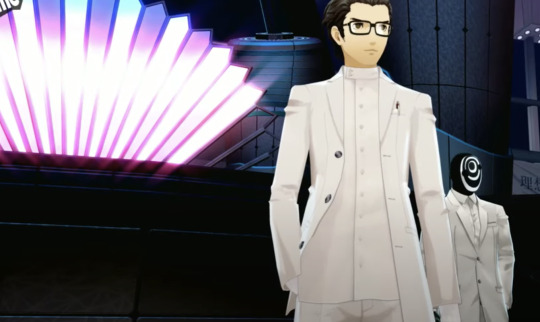
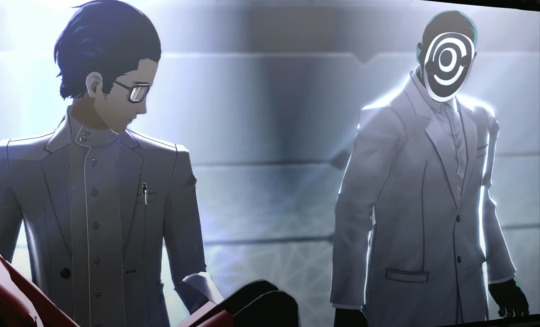

I don’t think i’ve talked about how much i love the lopsided smiles on these masks. Because i love it. it’s just the right amount of unsettling and creepy. fUCk. And the twitching, twisting, and the weeping blue paint that Hastur’s shadow form does before transforming is /chefs kiss. I wanted more.
Anyway, onto Hastur’s design. Not a labcoat this time, just an ordinary looking white suit with no tie. This is the only time we see Maruki have a bodyguard shadow -- something else he relies on. Hastur’s presence in this scene only shows how deeply afraid and uncomfortable Maruki actually is with intruders in his palace. This experience is a reminder that someone had come into Rumi’s parents house to kill him years ago (a theory for another time). Like that incident years ago, he doesn’t resort to violence here -- he did and does try to negotiate. But when that didn’t work, at least now he has something that can fight for him.
( It is only in the second infiltration when we see Maruki actually take a more active role -- but I won’t get to that here. )
Hastur: Stubborn imbeciles, rejecting our lord ...
There is a running theme here, unfortunately. The shadows again cannot comprehend why anyone would choose to reject Maruki’s salvation, why anyone would choose suffering. And words like ‘foolish’ ‘misguided’ and finally ‘imbeciles’ here are all used to describe those who choose to reject it. While i do think Maruki only bends reality if the person wishes it (subconsciously or consciously), and does accept that there are people who won’t accept their wishes being granted and is aware of the reasons why-- He cannot fully understand or emphatise with it.
4) These deformed Maruki-like shadows guarding the control room

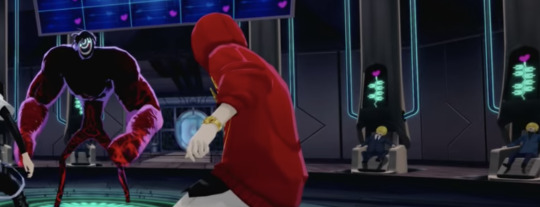
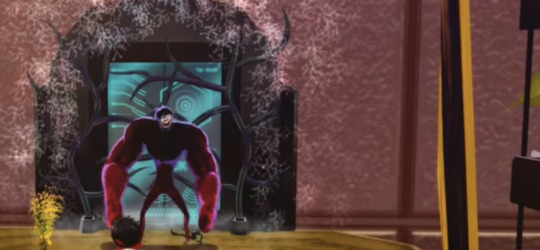

Jesus christ above, i don’t like these, because they contrast with all other designs as these are more brutish and deformed. There’s used as gatekeepers at certain points of the palace, in the first control room, and later on in the brain-pod-room (my brain cells are stopping to work now excuse me) before the garden puzzle portion, at his final will seed and the entrance to the garden of eden.
We know Maruki isn’t a brute strength kinda person. And yet we see these few who’s only purpose is to defend certain things and areas with force. Its uncharacteristic, but at the same time, given the things that these shadows are defending -- it makes sense. No cunning, no wit, no negotiation, no compassion -- just forcefully defending very important parts of his heart and his work.
Shadow (at the control room): So you dare defy His Excellency. You shall not interfere with our master’s work!
Shadow (brainwash room): Foolish rebels! You won’t take one step past here!
Shadow (entrance to garden of eden) : You?! I can’t believe you’ve made it so far ...
I had to do a double take on this. I think this is the only time this title ‘His Excellency’ has been used in the palace. While it is used for catholic bishops and that sort -- its mostly used in the context of heads of state, ambassadors-- more secular roles. The other times this shadow speaks is also similarly less reverent, less religious orientated. Of course this makes sense if the only function of these shadows is to use force to defend. They’re not the scientists or the first maruki-imitation shadows -- they’re not as devoted, and they dont have to be.
5) Finally, these limbless noodles
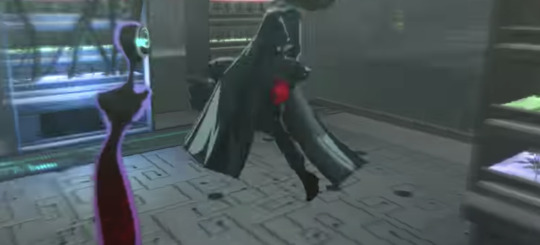
This one is found during the horticulture portion of the palace. I can’t exactly figure out why. And as far as i can tell, they only appear in this portion of the palace.
As far as the design goes -- these are probably the most unhuman like. Slender, androgynous with only a mask. I’ve got nothing. Braincells ran out. Sorry!
(Haha androgynous maruki go brr)
SO! That’s it. thanks for coming to my ted talk and following me down this rabbit hole. I need to go and drink some fuckin tea.
#(( jester being a real bro here#(( enabling me and my insanity#f: notes#c: the self#takuto maruki#(( slides this into the main tag#appleyjuiceboy#p5r spoilers
70 notes
·
View notes
Text
Long Post! Hit J if you want to skip!
My guild has recently had a lot of conversation on Jessica Price and Peter Fries who were recently fired from ArenaNet’s Guild Wars 2 development team. I’m pretty sure that most everyone that could care has heard about it, but what is confusing me is why people are trying to die on hills for two people that really did not come across as anything other than gatekeeping assholes.
To be clear, if you disagree with this statement then that’s fantastic. Because I am posting this on social media, I am expressing tacit approval for you to respond to it, dislike it, deconstruct it, or whatever you wish. This doesn’t mean that I have to like what is being said, but the condition that “if I post this on the internet, then someone may reply to it” is a fairly sound one.
To cut through a lot of the fluff, I’ll summarize:
A developer, Jessica Price, was on her personal twitter discussing the problems with MMO development.
Per usual, a mob formed to express their opinions. It’s the Internet, so that means saying a lot of crude, disgusting, sexist, and absurd things.
Within this mess, one person - Deroir - decided to voice his own opinion. I wouldn’t say that he’s an expert (I wouldn’t say that she was either since Guild Wars 2 is a mess...) but I will indicate that among the throngs of the “laymen” (as Fries put it), he at least has some affiliation with the IP.
Deroir Says: Really interesting thread to read! However, allow me to disagree *slightly*. I dont believe the issue lies in the MMORPG genre itself (as your wording seemingly suggest). I believe the issue lies in the contraints of the Living Story's narrative design; (1 of 3) When you want the outcome to be the same across the board for all players' experiences, then yes, by design you are extremely limited in how you can contruct the personality of the PC. (2 of 3) But, if instead players were given the option to meaningfully express *their* character through branching dialogue options (which also aren't just on the checklist for an achievement that forces you through all dialogue options), (3 of 4 cause I count seemingly...) then perhaps players would be more invested in the roleplaying aspect of that particular MMORPG. Nonetheless, I appreciate the insightful thread! (End)
To which Price replies: thanks for trying to tell me what we do internally, my dude 9_9
And Deroir replies: You getting mad at my obvious attempt at creating dialogue and discussion with you, instead of just replying that I am wrong or otherwise correct me in my false assumptions, is really just disheartening for me. You do you though. I'm sorry if it offended. I'll leave you to it.
The above is their initial discourse and honestly because I don’t feel like posting all of the tirade that follows, I’ll leave it at that for now.
The initial concern was: Should Jessica Price have been fired for ‘going off’ on Deroir? An example of things said:
“Like, the next rando asshat who attempts to explain the concept of branching dialogue to me — as if, you know, having worked in game narrative for a fucking DECADE, I have never heard of it — is getting instablocked. PSA I’m not on the clock here. I’m not your emotional courtesan just because I’m a dev. Don’t expect me to pretend to like you here.”
That is not acceptable, at all. I would fire anyone that was interacting with my customers while being associated with me, on the basis of that alone. It is true that she was on her own “private” account, but she was discussing work related information, using her work related title, and using her work related position to open a dialogue (or a monologue, as it seems) with those that were actively purchasing my product.
There have been arguments that he mansplained (read: explained something to her as if she were unaware despite her experience based on her gender) and then secondary calls that “she had dealt with a lot of harassment before so this wasn’t her fault,” but those are two faulty premises:
First, because she was the one that opened this discussion on social media. If she wanted to avoid responses or only take on “educated information” then she could have either placed it in an article or circulated her complaint among her former co-workers.
Second, if there was a sea of hateful people that had been harassing her, then this hardly seems like the right time to “take it out” on someone. I do not know the struggles of women on the Internet, but I know what it’s like be a black person on the Internet so I can say only that while it is true that you will always assume a certain amount of hostility, just taking it out on the first person that speaks is absurd.
If, for example, there really was a rabid mob crying for Price’s blood, then why wouldn’t she unload her ‘emotional courtesan’ spiel on them and not someone that as objectively as possible was being inoffensive if not a bit tone deaf to her mood? The self-fulfilling remedy that he “was mansplaining” as justification for her very rude tirade absolutely does not address that his only offense was again, speaking to a very neutral point.
What is worse, this has become a matter of someone being fired over her gender rather than the truth of the matter, which is that she was just an asshole. People are canceled, rightly, from minority groups all the time. If Kanye West flew off the handle on someone, I wouldn’t rush to defend the ‘slavery is a choice” dude even if it is good to have black men in the spotlight. Cut the string and let them drown under the undertow of their own shit, as far as I am concerned.
Arguing that systemic oppression mandates random aggression is not appropriate. Certainly it explains why it happens, but as we all have our own independent dignities then you cannot justify a random attack as one that was “deserved.” Let us remove from the discourse that Deroir was a person affiliated with GW2 and leave it simply at a person says something that a person at a public forum doesn’t like. Because, private or not, twitter is public and social media... And that person then starts shouting at them for being an asshole, in what way is that permissible or excusable?
It isn’t. The company was right to fire her, not because of “capitalism” or “corporatism” but because she acted out of line. If anything, many of us have learned there is a higher burden against us for the fact we are of a protected class, yet that is not an excuse not to aspire and to strive. Female developers are pretty undervalued and underrepresented in the gaming industry, so why would she throw away her chance like that?
If you argue, “well she doesn’t have the responsibility of putting on for anyone else other than herself,” then you immediately invalidate the need to protect her. Being a woman is not the same as being a representative of what women can do. Margaret Thatcher and Joan Rivers are not hailed as feminist icons for a reason.
Now the “gatekeeping asshole” part comes up when you get into the nitty gritty of what Fries, who was also fired (and as far as I know identifies as a male), added to the conversation:
“Here’s a bit of insight that I legitimately hope he reflects on: she never asked for his feedback. These are our private social media accounts — imagine you’re an astronomer and you start sharing some things you’ve learned in the last few months since you began a research project observing Saturn, only to have observation techniques explained to you by a layman ... Jessica is great at her job and deserves to be treated with respect.”
The sentiment doesn’t hold water for quite a few reasons, so let’s deconstruct those because that’s what this post is about.
First, we’ve already touched on “these are private social media accounts.” Yes, we know they are “off the clock,” but they are discussing their job all the same.
The example of an astronomer also really sets the pace for what is to follow though. Is a game developer like an astronomer? A person that more or less puts down the tracks that players work through? I don’t think the requirements between the two are remotely similar, but let’s move beyond that and say, an astro-physicist like Neil deGrasse Tyson decides to get into a conversation with some people at a local pub!
Neil is a little miffed about research on Saturn’s observation and one of the pub goers chimes in that maybe it’d help if they used some of the techniques learned in deep sea exploration to observe Saturn.
Immediately, Neil says “Thanks for the non-answer, my dude” and then returns to say “And by the way, you colonizing piece of shit, I work at the Rose Center of Earth and I know than you ever possibly could, so next time you open your mouth remember that I know more than you ever will because I’ve been doing this a lot longer than you, shithead. I’m not your emotional porchmonkey.”
I mean...
I assume you’re going to get a tap from someone about how that wasn’t okay to say? Now even if there were a lot of people getting boisterous, why pick that person out? Even if this is your “go in moment” why pick a person that’s inoffensive? Because you have something to prove. And well, the company has something to prove as well: it isn’t going to allow its image to be tarnished.
But at the heart of it, is this concept that the people she discussed this with are the knuckle dragging laymen incapable of understanding the Promethean wonder that is game development. If that is the case, then why discuss it at all? The questions continue to pile and the explanations became weaker.
In the end, I don’t like ArenaNet but I also think Reddit is a disgusting pit of scumbag racists, sexists, and shitlords. That being said, it really sucks that both of these companies had an easy pass to drop two people that were clearly negative elements to their environments.
This isn’t a hill worth dying on. Hell, this isn’t even a hill worth stopping and getting a picture of. Because at the end of the day?
Jessica Price isn’t right.
27 notes
·
View notes
Text
Trivial Pursuit (Domark, Spectrum, 1986)

Gallup all formats chart, Your Computer Vol. 7 No. 1, January 1987

Trivial Pursuit the board game divides the world of knowledge into six categories; six wedges of cheese for six spaces in a wheel with six spokes. In pursuit of rounded knowledge from Trivial Pursuit the computer game of the board game, there seems no better framework to adopt than its own.


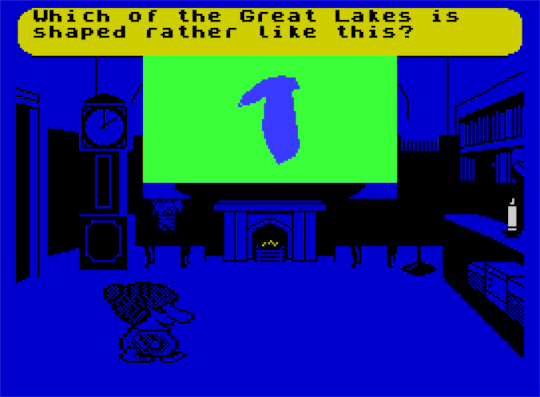

By the time 1986 turned into 1987, electronic games had become well established as a leisure pursuit in their own right. For the teenagers of the time, they had been popular in some form for their entire lives. The ZX Spectrum and Commodore 64 had been out for five years, and increasing numbers of parents were being persuaded of their educational and fun value. That would carry on -- I got my own Commodore 64 several Christmases later. As discussed a few entries back, computer games were sold in the biggest high street shops. Meanwhile, sports are a familiar subject for AAA. Making games about subjects people already know well is an easy route in for an audience. Taking an already popular activity like football with its own set of defined rules and turning it into computerised form is an even more obvious thing to go for, on both the developers’ side and the players’. With that background, it is no surprise at all to find other existing leisure activities being successfully translated into computer games. The board game Trivial Pursuit was of a similar age to the Spectrum and C64, still in an initial swing of popularity which meant that an electronic version of it wasn’t trying to replace a well-established favourite like Monopoly, but offering an alternative or addition to the fun thing you’d recently come across. The computer game’s manual explicitly calls it a game that “the whole family (Mum and Dad included!) enjoy enormously.” On Christmas Day 1986, many British families must have gathered round the Spectrum after dinner for a game of Trivial Pursuit.

Computer science, particularly at the kind of price that was able to reach large numbers of game-playing households, had only advanced so far. This presented some technological barriers to recreating the Trivial Pursuit experience. Representing the colour brown, for instance, was apparently an unachievable task, and so the art & literature wedge becomes black. Still, Trivial Pursuit is a very viable candidate for transfer to computer form, comprising as it does of a series of trivia questions with a limited appendage of choosing movement and collecting tokens. So the dice also go, replaced by a random dart-throwing animation which captures a miniscule fraction of the tactile sense of ceremony, but mostly the game is intact. Expanded on, even, since the board game couldn’t offer musical rounds where listening to “She’ll Be Coming Round the Mountain” is an essential part of the experience, or easily offer picture rounds. The one remaining issue is that of the mechanics of answering questions. I assumed going in that there would be some kind of multiple choice arrangement, but the actual solution is much more simple and elegant. The game just poses each question and then asks whether you got it right, Y/N? Players of the board game similarly get an answer written down and have to determine among themselves whether the player asked it answered satisfactorily, so why should a computer recreation of the experience be any different? The psychology of presenting an irreversible button-press and relying on players’ honesty in this way is nonetheless a fascinating sideshow all of its own.

I’ve talked previously about the strength of games as ways of presenting spaces. Trivial Pursuit has several spaces to present. One is the board, a recreation of a physical object with functionality retained and resemblance to the original object at the forefront. Another of its spaces is the more completely imagined room in which the question master paces backwards and forwards, surrounded by items to represent the different question categories. Sometimes it goes dark, giving the idea of an image being cast by a projector, the game turning into both test and lecture at the same time. Among the items in the room is a world map up on the wall. And what is a chart but a map of territory, of tangible or intangible space? The Gallup charts by which we are finding our way through the AAA journey are maps of their own territory, suspended between imaginary and real. SalesSpace, we could call it. In SalesSpace, the things that count are time and format and sales, and that’s what’s reflected in the picture of relationships between games that charts of SalesSpace show. In SalesSpace, board game recreation Trivial Pursuit and World War II shoot-em-up 1942 sit together in the same top ten. In SalesSpace, Trivial Pursuit goes between well-remembered arcade games Paperboy and Gauntlet along the route through the UK’s #1 games. Look along the right axes and what you might have thought of as very separate places turn out to be right next to each other.

One of the first things that’s obvious on playing Trivial Pursuit the computer game is its commitment to being as accessible as it can. It’s notable that it uses the keyboard’s arrow keys for directional controls, rather than QAOP or one of the other arcane combinations other Spectrum games tended to go for. Anyone was clearly meant to be able to turn up and figure out what was happening as quickly as possible, and that holds up. Admittedly if I didn’t already know the rules of Trivial Pursuit I would need the manual at hand, but that goes for the board game too. Past that, the basic action of answering trivia questions is fun, its questions are pretty well-pitched as easy but not too much so, and the attention to detail seems reasonable (I haven’t encountered any Hugh Jackilometresans so far). The choice of questions goes for timelessness, even more than the board version since the music question choices are backwards looking, presumably to keep the sound samples copyright-free. Where it doesn’t achieve that timelessness, the perspective on what has changed in three decades makes for intriguing wrinkles -- you could probably still ask “What was Mrs. Fawlty’s Christian name?” but not in those words. Trivial Pursuit is one of the most straightforwardly entertaining games I’ve played for AAA so far.

But is it art? It’s not a question that I’ve engaged with on this blog elsewhere, because it’s not very interesting, but it’s one that somehow doesn’t go away. An inferiority-complex-driven need to justify video games to outsiders as being art seems to have infinite lives. Worse, within some very loud pockets of game culture, that need sits alongside a vicious refusal to tolerate the kind of cultural criticism that art tends to get. Sometimes the same people are the ones saying both, and more. There’s no place for politics in games, apparently. Narrative events only ever happen inside the context of the narrative and not a wider context of authorial choice. Games should just be fun, OK? But, of course, the right kind of fun. The wrong kind of fun means a non-game, a phrase I became familiar with as I re-engaged with video games in the Wii and DS era and read NeoGAF, a gaming forum which was relatively open and welcoming (i.e. it was merely toxic rather than a seething hellscape). Wii Sports was a non-game. Non-games are successful games which are too popular and do too many things which games don’t do to count as games. In a weird inversion of the ‘how is this art?’ Turner Prize winner phenomenon, the mainstream audience sees non-games as a perfectly fine type of game and the enthusiasts proclaiming themselves at the centre of the culture completely deny non-games a place in the category. Not in the sense of them being too lowbrow, but of trying to define them out completely. Trivial Pursuit would surely have counted as a non-game. Which is nonsense, obviously. It provides an experience of a virtual space that’s dependent on the player’s actions, producing an emerging narrative within its bounds. I can’t work out a plausible game definition which wouldn’t include it without going absurdly narrow. Its selection of questions is a meaningful creative decision, illustrating and reinforcing what knowledge is seen as worth knowing. As for the wider art question, let’s just say that I have an equally tough time with any argument that identifies Frank Bruno’s Boxing as art and doesn’t do the same for Trivial Pursuit.

One of the more successful tactics of the kind of gatekeepers who talk about non-games is an appeal to history. They were here first. People who want something different than monolithic hardcore games are trying to change the rightful way of things proven by time. The whole idea of non-games has that idea of definition-by-precedent built in. Yet find the right maps and this appeal to history is revealed as not only bogus, but bogus even within the boundaries of its own arguments. Casual games and casual players have been here thriving all along. As 1986 turned in 1987, more people were going to their local high street WHSmith and buying Trivial Pursuit the computer game than were buying anything that has outlasted it as an emblem of retro gaming. The world mapped out by the games charts has always been a big one with room for many perspectives and interests. It’s not surprising, because it’s the same story for other media. And yes, other media have their own purer-in-the-old-days crews, too. Music discussions are crowded with talk of how things were better in the past when real music ruled. But significantly, it’s almost as common to see the response that there has always been music of different types in every era, even if it’s likely to be phrased as ‘there has always been disposable pop’ or something more derogatory. The narrative of aberration can’t stand when enthusiasts are engaged with the reality that refutes it. It’s much tougher for ahistorical nonsense to gain any credence when reality is a matter of public record, the charts that map history still accessible. But what if your medium has failed to keep its history up so well? What if the only history most get to see is filtered through the nostalgia and commercial goals of a specific set of winning viewpoints? What if Gauntlet is commemorated but Trivial Pursuit isn’t? Then the gatekeepers can just keep on pretending that the current version of what they don’t approve of is a new aberration, restarting their game to fight the same fights over and over again from a position of illusory strength. The selective retention of knowledge is anything but trivial.
Q: What was the UK’s best-selling computer game at the turn of 1987?
A: Trivial Pursuit.
1 note
·
View note
Link
Many US Citizens take our citizenship for granted. It’s something most of us never worry about or think about, and the majority of us have never experienced life without it. As a consequence, we are incredibly out of touch with what privileges come with citizenship and what our impact as citizens can have on our undocumented friends and neighbors.
If we are serious about defending DACA (Deferred Action for Childhood Arrivals) , organizing against ICE raids and detention centers, and exploring other ways to exercise allyship with undocumented folks, there are precautions we must take.
Organizing against deportations and the forces that carry them out is not like campaigining for a candidate, an initiative, or other causes we may all have experiences with- the risk is much higher. While organizing efforts may very well include politicians and initiatives, the nature of the work means that if we are not careful, we can literally get our colleagues, friends, and their families locked up or deported.
*You should not consider the following list legal advice nor an exhaustive list of precautions to take. If there are undocumented people in your lives or on your campaigns, someone should be reaching out to get familiar with their personal boundaries, risk levels, and safety plans.
Don’t Get Your Undocumented Friends in Trouble!1. Don’t “out” people who are undocumented.
This information in the wrong hands can be life or death. If it isn’t 100% absolutely necessary information, don’t include it, don’t bring it up, and don’t ask. Even if it is already public information, you never know who is listening or reading, or what their intentions are. Also consider this when choosing where to do voter registration drives where people may feel pressured to disclose their status.
2. Don’t “out” areas where undocumented people live.
Example: “We are going to organize/reach out to people in X neighborhood, because there is large undocumented population there.” Did I need to know that? No I didn’t. And ICE doesn’t need to find out either. Keep that to yourselves and those you are working with. If you were not explicitly asked by undocumented people there to organize with them, what business do you have going and making a bunch of noise there? Are you 100% familiar with how to protect their information, communicate safely and securely, and execute their safety and emergency plans? Probably not. Organize your own folks to leverage the resources and power you have.
3. Don’t prioritize appearing as though you are “centering those most affected” above not getting those “most affected” deported.
Political gatekeeping and tokenizing, especially in the social justice and nonprofit community, leads to safety issues.
Citizens- do not pressure undocumented people to out themselves or appear publicly just so you look like good allies or that you are “Centering those most affected.” Most of y’all “center” people publicly without “centering” them in the decision making anyway (but thats none of my business).
While there is nothing to suggest that this individual was pressured to speak in any way, in order to communicate the seriousness of this advice, it’s important to share that a DACA recipient was recently detained by ICE shortly after doing a press conference about fears of deportation.
Update: They are deporting the DACA recipient without a hearing.
Centering people includes way more than just physically having them show up to stuff. It also means centering their needs, risks, and boundaries when you are organizing.
4. Don’t list build if you don’t have to.
Lots of events, workshops, know-your-rights type events are happening around immigration and documentation. Consider doing away with the sign in sheet (there is no grant or money in the world more important than peoples actual lives). There is only so much information you really need to collect for contact information. Phone numbers, addresses, things like that are more than likely none of your business.
This includes taking photos of rooms where undocumented people are gathering.
5. Protect your lists as if your own deportation depended on it.
If you are going to have a sign in sheet anyway or other list of some sort, someone should be watching it all times. No one in the organization should have access who doesn’t need to. It should be destroyed as the soonest opportunity.
6. Don’t put YOUR OWN name on lists.
For example: Is there a link you can sign onto if you want to volunteer to protect undocumented people by keeping them in your home? Don’t fucking sign things saying you’re going to violate the law. I shouldn’t have to say this. It’s one thing to put your email on a chain to keep up with updates from the white house or local organizations, but it’s another to put your name on a list of people who are helping people do things the federal government explicity does not want. I don’t care how reputable the organization is. Information gets compromised. Don’t do it.
7. Some things you can do on your own, in secret- and you should.
You don’t need to join a church to keep someone in your house. You don’t even have to tell anyone that you are doing it. You shouldn’t tell anyone you are doing it. You should definitely not brag to anyone about it for ally points or street-cred. You would be putting yourself at legal risk, but more importantly, are endangering the person or family you are trying to help.
If you can do sneaky shit like keep someone in your house (or finance it for someone else), keep your name off lists saying you want to do that. Do it because it’s the right thing to do, not because you want to make sure people know how hardcore you are. Just do it and tell nobody. Create systems of anonymity if you and close friends are organizing it.
8. Understand that Homeland Security, ICE, and other federal agencies are not like your local police department.
Surviellance is real and so is the number of times both police departments and federal agencies have broken their own rules and laws to get the job done. When I say real, I mean malware on cell phones to collect data undetected, undercovers pretending to be activists and organizers, ICE agents pretending to be undocumented, and so forth.
ICE can also “ghost” a cellphone to pretend to be people close to undocumented folks and/or lure them into custody.
I don’t care how many of your friends are police officers or if you live in a sanctuary city. Your University or College could be a sanctuary campus, but they will still hand over every undocumented student they know of if the law requires it (don’t just believe me, ask your insitution yourself). Don’t talk to them about your activities with undocumented friends, look into the kind of technology that ICE, Homeland Security, the FBI, and so on use to conduct their operations and adjust accordingly- while local police are still becoming more and more militarized, these agencies have them beat by a long shot.
9. Stop fucking inviting your undocumented friends to the detention center.
This is for my local folks. My bright-eyed bushy-tailed “just want to do some good” PNW softies. The Northwest Detention Center is Homeland Security territory and you can bet getting close to it or regularly attending events there lands you on a sweet list, potentially along with cellphone data, biometric information, and so on.
“But an undocumented person invited me there, they always speak!” If you want stand at the detention center and risk your information then fine. But don’t bring your undocumented friends into the net of those who seek to capture them (whose information can also be compromised). The undocumented organizers who have been there for years have an incredible amount of political connections and lawyers- a safegaurd most don’t have. There isn’t a damn thing that happens outside that detention center that Homeland Security doesn’t know every detail about. Who is going, what those people do for work, where they live, what they look like, the agenda, the times, the threat level. It’s their job.
Undocumented people should be informed of the risks of participating in these places. Sometimes undocumented people go because they dont know the risks.
For example, sometimes when you go some weird guy you’ve never seen before is shuffling around the protest with google glass on and logging stuff into an iPad. That’s weird, people. Don’t bring your undocumented friends there. There are other things happening in the community.
10. Do not communicate about sensitive issues around documentation, immigration, etc on phones or digital devices, let alone the internet.
All that being said, your proximity to the detention center doesn’t totally exempt you from the surviellance or its consequences. Like any other activity you wouldn’t want the government having evidence of, keep it completely off of phone conversations, digital devices, and the internet. Malware is bad.
Imagine getting any one of your phones, computers, laptops, tablets, or other devices scooped up with a court order or worse, seized at the border- something border patrol can do at any time. This includes searches of your social media feeds, messages, etc.
If you use your fingerprint to unlock your phone, switch to an actual passcode. Legally your fingerprint is considered biometric data and is not protected, so they can force you to unlock your phone with your fingerprint. Not so with a passcode. Again, you shouldn’t be putting any potentially compromising information on your phone anyway, but safety first.
11. This includes your encrypted apps like Signal.12. This includes your email servers like RiseUp.Net.13. This includes Slack.14. I DON’T CARE WHAT YOUR CODER OR ANARCHIST FRIENDS SAID. DON’T TALK ABOUT SENSITIVE SHIT ON THE INTERNET.15. Do not spread information that you are not COMPLETELY SURE is accurate and verified.
Creating unjustified fear and paranoia can only make things worse, and is a form of control that we should not accidentally participate in. Many posts are going around without sources, without clear photos of logos and emblems (police and transit authorities being mistaken for ICE) etc.
In addition to being verified, information should be time-stamped with location (including state). A basic “ICE is on the metro” post can get spread to metro areas all around the nation causing unnecessary panic.
16. Do not post media of undocumented people on social media. Only videotape what is necesesary and destroy what isn’t needed.
There’s really no reason for you to have extensive photo or video footage of gatherings of undocumented folks. If they are hosting the event, they are perfectly capable of arranging their own photographers or videographers and likely already have.
Don’t post photos or videos of undocumented people on social media. It doesn’t matter if you see them posting photos of themselves or organzations led by undocumented people posting photos or videos.
I have heard large organizations recently retort that its “legal” to video tape “any public event” and so they will continue to do so- y’all are assholes. Cut it out.
17. Take the time to understand all the risk undocumented people face and how they are treated differently in the legal system.
White citizens- This is not like ratting out your buddy if you get caught shoplifting from Forever21. They do not get a fine or a night in jail or community service.
Undocumented people do not have the same rights as citizens. Undocumented people can be held in the detention center indefinitely. Undocumented people, except in very specific circumstances, do not have the right to a public defender, or any lawyer.
The risks you would usually consider are not the same. Learn about them!
18. Don’t ask undocumented people to take coordinated arrests.
If there is a time for political theater, now is not it. Do not ask your undocumented friends or rank-and-file to willingly give themselves to the legal system or draw attention to themselves so you can raise money or make a point.
As a reminder, this is not a complete list nor are risk levels the same for all undocumented people. There are extra considerations and risks according to race, class, gender, and so on. We should not let fear and paranoia paralyze us from action or lead us to engage in patronizing behaviors, but we also should not treat the movement to protect the safety and dignity of our undocumented friends and family without the precaution and respect they deserve.
This advice was written in collaboration with local leaders from the Washington Dream Coalition, an organization led by undocumented youth.
0 notes